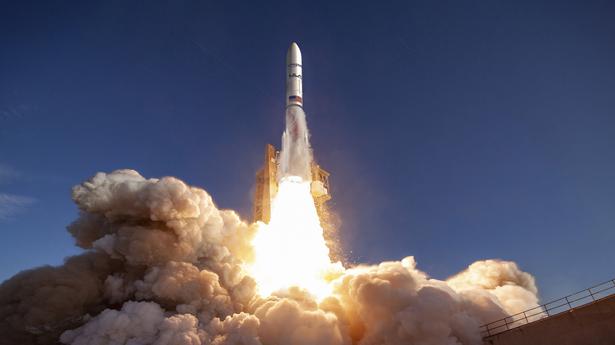
Amazon partners with three firms to launch its satellite internet constellation
The Hindu
The tech giant has secured a total of up to 83 launches over a five-year period, which according to the company, is the largest commercial procurement of launch vehicles in history.
Amazon has announced agreements with three companies – Arianespace, Blue Origin, and United Launch Alliance (ULA), to deploy the majority of its Project Kuiper satellites that aim to provide high-speed, low-latency broadband to a wide range of customers across the globe.
(Sign up to our Technology newsletter, Today’s Cache, for insights on emerging themes at the intersection of technology, business and policy. Click here to subscribe for free.)
The tech giant has secured a total of up to 83 launches over a five-year period, which according to the company, is the largest commercial procurement of launch vehicles in history.
The contracts include 18 launches with Arianespace’s Ariane 6 rockets, 12 launches using Jeff Bezos-owned Blue Origin’s New Glenn, with options for up to 15 additional launches, and 38 launches on Vulcan Centaur, ULA’s newest heavy-lift launch vehicle.
“Securing launch capacity from multiple providers has been a key part of our strategy,” Rajeev Badyal, VP of Technology for Project Kuiper at Amazon, said in a statement. “This approach reduces risk associated with launch vehicle stand-downs and supports competitive long-term pricing for Amazon, producing cost savings that we can pass on to our customers.
The announcement brings Amazon’s satellite internet constellation one step closer to reality, as its rival Elon Musk-owned SpaceX continues to launch more Starlink satellites, having launched about 2300 satellites already, and expanding Starlink’s presence with about 2.5 lakh subscribers globally.
Amazon’s present agreement with ULA is in addition to its existing deal to secure nine Atlas V vehicles from the space launch firm, announced in April last year. Besides, Project Kuiper plans to launch two prototype missions later this year on ABL Space Systems’ RS1 rocket.

Indian Forest Service (IFoS) officer R. Gokul, who was suspended by the State government in connection with a case filed in the Supreme Court seeking permission to denotify 443 acres of HMT forest land, besides writing a letter to the CBI, has reportedly admitted to his mistake and submitted an unconditional apology.





















 Run 3 Space | Play Space Running Game
Run 3 Space | Play Space Running Game Traffic Jam 3D | Online Racing Game
Traffic Jam 3D | Online Racing Game Duck Hunt | Play Old Classic Game
Duck Hunt | Play Old Classic Game









